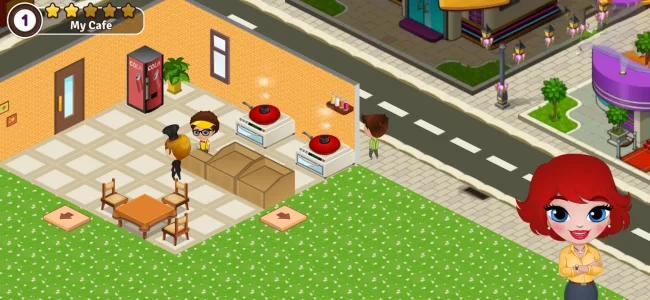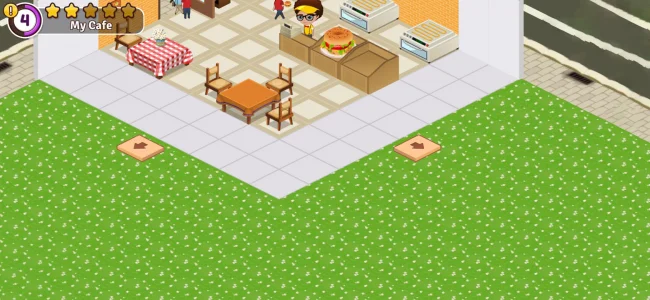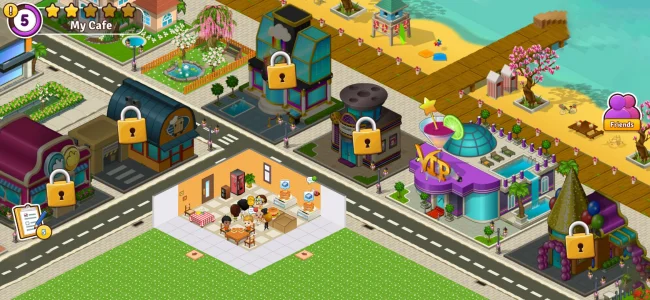Download Cafeland – Restaurant Cooking MOD 2026
*Cafeland – Restaurant Cooking* is a restaurant management and simulation game developed by the Turkish company GAMEGOS. The game’s key concept involves players building and operating a successful café, with the primary objective of progressing from a small snack bar to a 5-star establishment. Gameplay combines creative design, culinary management, and strategic business growth, requiring players to master recipes, customize their restaurant’s layout, and manage financial resources to expand their culinary enterprise.
Gameplay Gallery



Description
An In-Depth Introduction to Cafeland - Restaurant Cooking
Genesis and Genre Classification
Cafeland - Restaurant Cooking, also known under the official title Cafeland - World Kitchen, is a mobile game that operates within the simulation and tycoon genres. The game presents players with a top-down perspective for a detailed restaurant management experience. Its initial release on the Android platform occurred on August 10, 2016. The core objective tasks the player with transforming a humble snack bar into a globally acclaimed 5-star culinary establishment. The gameplay architecture is a sophisticated synthesis of three foundational pillars: creative interior design, intricate culinary management, and strategic business expansion. This title is available on Android and iOS platforms and is also accessible on PC or Mac systems through the use of Android emulators.The Developer: GAMEGOS and its Design Philosophy
The developer and publisher of Cafeland - Restaurant Cooking is GAMEGOS, a Turkish technology firm established in 2006. GAMEGOS cultivated its expertise in the social gaming sector, achieving significant success on the Facebook platform with titles such as the original Cafeland, Marketland, and Fashland. The company's portfolio demonstrates a strategic concentration on the casual, free-to-play mobile gaming market, which includes other successful titles like Manor Cafe, Adventure Bay, and Fashion Cup. The design of Cafeland - Restaurant Cooking is an evolution of a formula proven during the social gaming era, adapting mechanics like real-world cooking timers and asynchronous social features for a modern mobile audience. This design heritage informs the game's pacing, which can feel deliberate and is intrinsically linked to its monetization framework that often involves accelerating these timed processes.The Core Gameplay Architecture
The Foundational Loop: Design, Cook, Serve, and Grow
The player experience in Cafeland is built upon a continuous four-stage gameplay loop that propels progression. The first stage, Design & Decorate, grants extensive creative freedom to customize the café's aesthetic with hundreds of items, from flooring to functional cooking stations. This element is not purely cosmetic; the physical layout directly influences service efficiency, as poorly placed furniture can obstruct paths for staff and customers. The second stage, Cook & Prepare, involves managing the kitchen's output. The game contains dozens of recipes from diverse categories, each with specific attributes such as cost, cooking time, experience points (XP) reward, and servings produced. This requires players to strategically balance their stove usage between short-term and long-term dishes. In the third stage, Serve & Satisfy, completed dishes are sold from serving counters to a stream of virtual customers. Maintaining a variety of available food is crucial for maximizing coin income and customer satisfaction. This stage is enhanced by the appearance of celebrity guests, special NPCs who provide valuable mystery gifts upon being served. The final stage, Manage & Grow, involves reinvesting earned resources back into the business. Players manage finances and critical resources like refrigerator space to purchase new equipment, expand the café's physical area, and unlock more advanced recipes. This cycle of investment and return underpins the entire progression system.Advanced Mechanics: The Food Mastery System
A deeper strategic layer exists within the Food Mastery system, which rewards players for repeatedly cooking the same dish. Upon mastering a recipe, a player unlocks a set of significant, permanent enhancements for that specific dish. This mechanic encourages specialization and adds a long-term objective beyond simple recipe collection. The benefits of achieving Food Mastery are substantial and directly impact kitchen efficiency and profitability.- Increased Serving Amount: The mastered dish produces a higher number of servings per batch.
- Increased XP Gain: Cooking the dish yields more experience points, accelerating player level progression.
- Increased Unit Price: Each serving of the dish sells for a higher coin value, boosting overall profits.
- Decreased Cooking Time: The recipe requires less real-world time to prepare, increasing kitchen throughput.
- Decreased Cost: The initial coin cost to begin cooking the dish is permanently reduced, improving profit margins.
The Central Resource Challenge: Space Management
As players progress, the game's design introduces a central resource management puzzle centered on the tension between stove capacity, counter space, and refrigerator storage. Players eventually reach a point where their upgraded stoves can produce food much faster than their counters can sell it or their refrigerators can hold it, creating a persistent bottleneck. This overabundance of food is a manufactured crisis designed to challenge space management. The most direct solution to this problem is purchasing café expansions and additional storage, which are among the most expensive items in the game, with some expansions costing up to $69.99 in real currency. This system illustrates how the core gameplay is engineered to guide players toward a challenge that strongly incentivizes high-value in-app purchases.Expanding the Experience: Game Modes and Social Features
Integrated Mini-Games and Recurring Events
Cafeland extends its core simulation with a variety of secondary game modes and time-limited events that drive long-term engagement. Integrated mini-games include Gummy Match, a classic match-3 puzzle, and Cake Merge, a merge-style puzzle game. While these offer alternative gameplay, the mandatory inclusion of Gummy Match in competitive events is a frequent point of contention within the player community. The competitive heart of the game resides in its recurring events. Club Challenges and Tournaments are weekly collaborative and competitive events for player groups. The Cooking Frenzy is a notoriously difficult multi-day solo event that presents a checklist of demanding tasks, often considered nearly impossible to complete without spending premium currency, effectively creating a "frustration loop" that encourages monetization. Other rotating events like Bubble Race, Sweet Rush, and seasonal holiday celebrations provide ongoing variety.The Social Fabric: Clubs and Community Interaction
Reflecting its social gaming origins, Cafeland incorporates robust social systems. Players can form or join "Clubs" of up to 30 members, which function as the central hub for participating in weekly competitive events and offer a private chat channel. An active club is essential for succeeding in these modes. Additionally, a friends and neighbors system allows players to add contacts, visit their respective cafés, and exchange mystery gifts. These features foster a sense of community and mutual benefit, reinforcing the social aspect of the gameplay experience. The primary hub for community discussion for the mobile version is the subreddit r/cafeland.The In-Game Economy and Monetization Model
Currencies, In-App Purchases, and Rewarded Advertising
Cafeland - Restaurant Cooking utilizes a sophisticated free-to-play economy built on a hierarchy of currencies. Coins represent the primary soft currency, earned from sales and used for basic purchases. Cash is the premium hard currency, primarily acquired with real money, used to bypass timers and purchase exclusive items. Vouchers and Sauces are secondary resources required for high-tier progression and event completion, respectively. This multi-currency system creates shifting bottlenecks, where a player who masters one resource economy may find their progress blocked by the scarcity of another, creating multiple monetization opportunities. The monetization model is supported by a wide range of in-app purchases (IAPs), from special offer packs and event passes like the Gold Pass to major café expansions. For non-spending players, a deeply integrated rewarded advertising system provides a viable, though slower, path to acquiring premium resources. Players can optionally watch video ads to receive daily rewards, earn bonus Cash, multiply prize wheel winnings, and replenish energy in mini-games. This system balances the economy by allowing free-to-play users to make meaningful progress.Technical Specifications for Installation
Android APK Requirements and Emulator Support
For users installing via an Android Application Package (APK), the game is often distributed as an XAPK file. This format bundles the base APK with necessary data assets and requires a specialized installer utility for proper setup. As of late 2025, version 2.58.7, with a file size of approximately 228.32 MB, was available on third-party stores. The minimum operating system requirement for Android devices is Android 7.1 (Nougat). The game is also fully compatible with PC and Mac platforms through Android emulators like BlueStacks and NoxPlayer. Emulation offers benefits such as a larger screen and mouse controls, with some emulators providing advanced features like Macros and Scripts to automate repetitive in-game tasks.Concluding Analysis
Cafeland - Restaurant Cooking is a mechanically robust and engaging title in the restaurant simulation genre, built upon a compelling core loop of design, culinary creation, and business growth. Developer GAMEGOS has effectively translated its social gaming experience into a mobile product with significant depth, offering extensive customization and a long-term progression path. However, this engaging core is intrinsically linked to an aggressive monetization strategy. The game's design deliberately creates resource bottlenecks, particularly in space management, that are most easily overcome through real-money purchases. Competitive events, especially the Cooking Frenzy, are structured to function as resource sinks that heavily incentivize spending. For the player pursuing an APK download, the game offers a rich simulation, but success as a free-to-play user requires considerable patience, strategic planning, active club participation, and a high tolerance for grinding through monetization pressures. The journey to a 5-star café is long, but for those prepared for its challenges, a deeply rewarding experience awaits.An Analytical Guide to Cafeland – Restaurant Cooking
Cafeland – Restaurant Cooking is a simulation and management game where players assume the role of a café owner. The primary objective involves developing a modest snack bar into a renowned 5-star culinary establishment. Gameplay integrates three core pillars: creative restaurant design, detailed culinary management, and strategic business expansion. Player progression is structured around a compelling gameplay loop that rewards both short, daily interactions and longer, dedicated play sessions.
The Foundational Gameplay Loop: Design, Cook, Serve, Grow
The player’s journey in Cafeland is built upon a continuous four-stage cycle that drives all in-game progress. Mastery of this loop is fundamental to building a successful and profitable restaurant. Each stage presents unique challenges and requires strategic decision-making.
Design and Customization
Players possess extensive freedom to customize every visual and functional element of their café. The game provides a vast catalog of decorative items, including flooring, wallpaper, tables, and chairs. This system allows for unique aesthetic expression. Design choices directly impact gameplay efficiency. The physical layout of the café dictates the movement paths for customers and staff, so an optimized floor plan prevents service bottlenecks and ensures food is sold effectively.
Culinary Production and Service
The kitchen serves as the operational heart of the player’s business. Players can prepare dozens of unique recipes from diverse categories like fast food, desserts, and international cuisine. Each dish possesses distinct attributes, such as a coin cost, a specific cooking time, an experience point (XP) value, and a fixed number of servings. Players must strategically manage their available stoves to balance the production of quick, low-yield dishes with long-term, high-yield culinary projects. Once prepared, dishes are placed on serving counters, where they generate income from a constant stream of customers. Keeping customers satisfied with a variety of food choices maximizes coin earnings and tips.
Management and Expansion
Resources earned from serving customers are reinvested to grow the business. Players manage their finances to purchase additional stoves, counters, and decorative items. A critical management challenge involves the limited refrigerator space for storing cooked dishes. Growth is achieved by expanding the café’s physical footprint and unlocking more complex recipes. This cycle of investment and return propels the player’s progression and enables the transformation of their small café into a world-famous enterprise.
Advanced Progression: The Food Mastery System
Beyond basic cooking, the Food Mastery system introduces a long-term strategic layer that rewards specialization. By repeatedly preparing the same dish, a player eventually masters that recipe. Achieving mastery unlocks powerful, permanent perks that significantly improve kitchen efficiency and profitability. These benefits include an increased serving amount per batch, higher XP gain, a greater unit price per serving, decreased cooking time, and a reduced preparation cost. This system encourages players to identify and focus on a selection of key dishes, creating a deeper level of strategic planning that goes beyond simple recipe completion.
Game Modes, Events, and Social Features
Cafeland extends its core management gameplay with a variety of secondary modes, competitive events, and social systems. These features provide diverse challenges and are the primary drivers of long-term player engagement.
Integrated Mini-Games and Special Guests
The game incorporates permanent side modes, including a match-3 puzzle game called Gummy Match and a merge-style mini-game known as Cake Merge. These modes are often integrated as requirements for completing tasks in larger, time-limited events. Additionally, players can invite special celebrity guests to their café. Satisfying these unique NPCs rewards players with valuable mystery gifts and positive remarks, adding a periodic, high-value objective to pursue.
Recurring Competitions and Events
Time-limited events form the competitive core of the game. Club Challenges require members of a club to work collaboratively toward a collective goal, unlocking tiered rewards for all participants. Club Tournaments pit different clubs against each other on a competitive leaderboard. Solo events, such as the Cooking Frenzy, present players with a long checklist of demanding tasks that escalate in difficulty over time. The game also features a rotating calendar of seasonal events, such as the Bubble Race and Sweet Rush, which introduce fresh challenges and rewards.
Social Interaction and Collaboration
Social systems are a foundational component of the experience. Players can form or join clubs of up to 30 members to participate in weekly challenges, share strategies, and collaborate. An active club is crucial for success in competitive modes. Players can also add individual friends, visit their cafés to perform helpful actions, and exchange mystery gifts, which fosters a sense of community and mutual benefit.
A Player’s Playbook for Strategic Success
Success in Cafeland requires a combination of active management, long-term planning, and efficient resource allocation. The following strategies provide a roadmap for players at all stages of progression.
Beginner’s Guide to a Strong Foundation
For new players, the initial hours are critical for establishing a stable economic base. The guided questline, offered by characters like Eva and Grandpa Tony, teaches core mechanics and provides essential rewards that accelerate early progress.
- Prioritize Fast-Turnaround Dishes: Focus on cooking short-term, low-cost recipes like Hamburgers. Their rapid completion time generates a steady flow of coins and XP, which are necessary for the first wave of upgrades and level-ups.
- Follow the Character Quests: Completing the tasks provided by in-game characters should be the top priority. These quests function as a tutorial and offer valuable resources to new players.
- Optimize Your Initial Layout: Ensure there are clear, unobstructed paths for waiters to move between counters and tables. A common early mistake is placing furniture too closely, which creates service bottlenecks and lost income.
Intermediate Strategy: Resource Optimization
As the café expands, the gameplay focus shifts from pure growth to the efficient management of time and resources. Players should identify a few profitable or frequently requested dishes and focus on achieving Food Mastery to gain a significant competitive advantage. For events requiring tip collection, advanced players use decorations to block customer access to counters, forcing them to order and sit immediately, which dramatically increases the rate of tip generation.
Advanced Tactics: Mastering Events
High-level events demand specific strategies to maximize rewards. For party-based events like the Bubble Race, players can repeatedly activate the party with the easiest requirements by grinding a quick-cooking dish like the 40-second Bagel Sandwich. This method, combined with boosters, allows for the rapid accumulation of event-specific points. To manage late-game customer complaints about a “lack of choices,” players should dedicate counters to different food categories rather than simply filling them with a large quantity of one dish type.
Understanding the In-Game Economy
The game’s economy is built upon a hierarchy of currencies and resources that gate progression. Coins are the primary soft currency, earned from food sales and used for standard purchases and cooking costs. Cash is the premium hard currency, used to bypass timers and acquire exclusive items. Vouchers are special tokens required for high-tier unlocks like café expansions. Finally, consumable booster items called Sauces provide temporary benefits that are often essential for completing demanding event tasks. Effective management of all these resources is key to long-term success and steady progression through the game’s many challenges.
